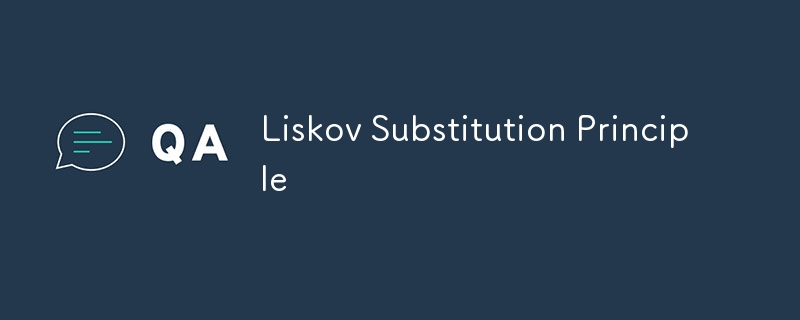Home >Java >javaTutorial >Liskov Substitution Principle
Liskov Substitution Principle
- PHPzOriginal
- 2024-08-25 22:30:361242browse

Objects should be replaceable with their subtype without affecting the correctness of the code
Let's understand this with inheritance(Is-a relationship)
example: Ostrich is a bird, Hunchback is a car, etc.
Example: Racing-car is a car
public class Car{
public double getCabinWidth(){
//return cabin width
}
}
public class RacingCar extends Car{
@Override
public double getCabinWidth(){
//UNIMPLEMENTED
}
public double getCockpitWidth(){
//return the cockpit width of the racing car
}
}
RacingCar overrides the getCabinWidth() of the car class but leaves it unimplemented because Racing cars don't have cabin width( if you see a Formula 1 racing car, it does not have any interior space, all it has is just a cockpit where the driver sits)
Hence the interior space in a racing car is called a cockpit.
Note: Racing cars have some specifications that might not match the generic car
public class CarUtil{
Car car1 = new Car();
Car car2 = new Car();
Car car3 = new RacingCar();
List<Car> myCars = new ArrayList<>();
myCars.add(car1);
myCars.add(car2);
myCars.add(car3);
// this will not work in 3rd iteration, because the getCabinWidth() in RacingCar is not implemented
for(Car car : myCars){
System.out.println(car.getCabinWidth());
}
}
This is a design that has been exposed, as the for loop will fail for the third iteration.
To fix this we have to strike at the root which is Inheritance itself.
Solution 1 : (Breaking the Hierarchy)
We have to break the inheritance, instead, we will come up with a common parent for both Car and RacingCar
We will create a very generic parent class called Vehicle
public class Vehicle{
public double getInteriorWidth(){
//return the interior width
}
}
public class Car extends Vehicle{
@Override
public double getInteriorWidth(){
return this.getCabinWidth();
}
public double getCabinWidth(){
//return cabin width
}
}
public class RacingCar extends Vehicle{
@Override
public double getInteriorWidth(){
return this.getCockpitWidth();
}
public double getCockpitWidth(){
//return the cockpit width of the racing car
}
}
public class VehicleUtils{
Vehicle vehicle1 = new Car();
Vehicle vehicle2 = new Car();
Vehicle vehicle2 = new RacingCar();
List<Vehicle> vehicles = new ArrayList<>();
vehicles.add(vehicle1);
vehicles.add(vehicle2);
vehicles.add(vehicle3);
for(Vehicle vehicle : vehicles){
System.out.println(vehicle.getInteriorWidth());
}
}
**Breaking the hierarchy: Break the hierarchy if the substitution fails
Solution 2: Tell don't ask
Let's take another example of Amazon
Amazon offers x amount of discount on all the third-party products.
And offers 1.5 times x on all its in-house products (Amazon Basics products are Amazon in-house products)
public class Product{
public double discount = 20;//x amount of discount on all the third-party products on Amazon
public double getDiscount(){
return discount;
}
}
public class InHouseProduct extends Product{
public void applyDiscount(){
discount = discount*1.5;// 1.5 times more discount on InHouseProducts
}
}
public class PricingUtils{
Product p1 = new Product();
Product p2 = new Product();
Product p2 = new InHouseProduct();
List<Product> products = new ArrayList<>();
products.add(p1);
products.add(p2);
products.add(p2);
for(Product product : products){
if(product instanceOf InHouseProduct){
((InHouseProduct)product).applyDiscount();
}
System.out.println(product.getDiscount());
}
}
Note that the if statement is involved in updating the discount amount of InHouseProduct which is against the Liskov substitution principle ( as we should have been able to replace the object Product with its subtype InHouseProduct), but here in if statement we are manually updating the discount amount which should not be done.
A slight modification in the InHouseProduct class will fix this issue
public class InHouseProduct extends Product{
@Override
public double getDiscount(){
applyDiscount();
return discount;
}
public void applyDiscount(){
discount = discount*1.5;
}
}
And finally removing the if statement from the PricingUtils class
public class PricingUtils{
Product p1 = new Product();
Product p2 = new Product();
Product p2 = new InHouseProduct();
List<Product> products = new ArrayList<>();
products.add(p1);
products.add(p2);
products.add(p2);
for(Product product : products){
System.out.println(product.getDiscount());
}
}
Tell don't ask: Here we are telling the utils class to print all the discounts and the utils class does not have to ask anything ( as it was asking by if statement earlier)
The above is the detailed content of Liskov Substitution Principle. For more information, please follow other related articles on the PHP Chinese website!
Related articles
See more- How to Continuously Update a JLabel Using Swing Timer and SwingWorker?
- How to Group Java 8 Nested Objects by Multiple Keys Using Collectors?
- Here are a few title options, maintaining the question format: * How to Seamlessly Integrate Java into Python: A Comprehensive Guide to Choosing the Right Approach * Python Calling Java: Which Metho
- Should You Ditch `ContextLoaderListener` in Spring Web Applications?
- How to Get Method Parameter Names and Types Using Java Reflection?

